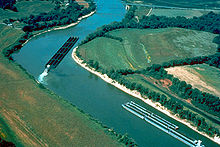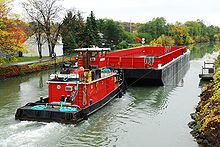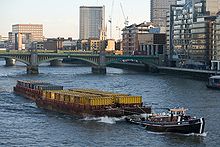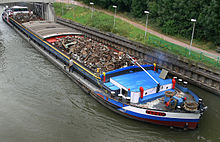- Barge
-
For other uses, see Barge (disambiguation).
A barge is a flat-bottomed boat, built mainly for river and canal transport of heavy goods. Some barges are not self-propelled and need to be towed by tugboats or pushed by towboats. Canal barges, towed by draft animals on an adjacent towpath, contended with the railway in the early industrial revolution, but were outcompeted in the carriage of high-value items due to the higher speed, falling costs, and route flexibility of rail.
Contents
Etymology
Barge is attested from 1300, from Old French barge, from Vulgar Latin barga. The word originally could refer to any small boat; the modern meaning arose around 1480. Bark "small ship" is attested from 1420, from Old French barque, from Vulgar Latin barca (400 AD). The more precise meaning "three-masted ship" arose in the 17th century, and often takes the French spelling for disambiguation. Both are probably derived from the Latin barica, from Greek baris "Egyptian boat", from Coptic bari "small boat", hieroglyphic Egyptian






and similar ba-y-r for "basket-shaped boat".[1] By extension, the term "embark" literally means to board the kind of boat called a "barque".
The long poles used to maneuver or propel a barge have given rise to the saying "I wouldn't touch that [subject/thing] with a barge pole." This is a variation on the phrase "I wouldn't touch that with a [insert length] pole." It appears that the association with barge poles came after the phrase was in use. Modern usage uses a 'ten-foot' pole, but the earliest instances in print involve a forty-foot pole [1], which is improbably long for operating a barge.
Types of barges
- Admiral's barge
- Barracks barge
- Car float
- Crane Barge
- Dutch barge
- Dry bulk cargo barge
- Hopper barge
- Jackup barge
- Lighter and Dumb steel lighter
- Liquid cargo barge
- Log barge
- Oil barge and Dumb steel oil barge
- Pleasure barge
- Power barge
- Royal barge
- Row barge
- Sand barge
- Severn trow
- Spitz barge
- Thames sailing barge
- Tom Pudding
- Vehicular barge
- Canal Motorship
On the Great British canal system, the term 'barge' is used to describe a boat wider than a narrowboat, and the people who move barges are often known as lightermen. In the United States, deckhands perform the labor and are supervised by a leadman or the mate. The captain and pilot steer the towboat, which pushes one or more barges held together with rigging, collectively called 'the tow'. The crew live aboard the towboat as it travels along the inland river system or the intracoastal waterways. These towboats travel between ports and are also called line-haul boats.
Poles are used on barges to fend off the barge as it nears other vessels or a wharf. These are often called 'pike poles'. On shallow canals in the United Kingdom, long punt poles are used to manoeuvre or propel the barge.
Modern use
A towboat pushing a barge on the Chicago River
Barges are used today for low-value bulk items, as the cost of hauling goods by barge is very low. Barges are also used for very heavy or bulky items; a typical barge measures 195 by 35 feet (59.4 m × 10.6 m), and can carry up to 1,500 tons of cargo.
As an example, on June 26, 2006, a 565-ton catalytic cracking unit reactor was shipped by barge from the Tulsa Port of Catoosa in Oklahoma to a refinery in Pascagoula, Mississippi. Extremely large objects are normally shipped in sections and assembled onsite, but shipping an assembled unit reduced costs and avoided reliance on construction labor at the delivery site (which in this case was still recovering from Hurricane Katrina). Of the reactor's 700-mile (1,100 km) journey, only about 40 miles were traveled overland, from the final port to the refinery.
Self-propelled barges may be used as such when traveling downstream or upstream in placid waters; they are operated as an unpowered barge, with the assistance of a tugboat, when traveling upstream in faster waters. Canal barges are usually made for the particular canal in which they will operate.
Many barges, primarily Dutch Barges, which were originally designed for carrying cargo along the canals of Europe, are no longer large enough to compete in this industry with larger newer vessels. Many of these barges have been renovated and are now used as luxury Hotel Barges carrying holiday makers along the same canals they once carried grain or coal.
Towed or otherwise unpowered barges in the United States
 Multiple barges pushed around a tight bend on the Cumberland River.
Multiple barges pushed around a tight bend on the Cumberland River.
In primitive regions today and in all pre-development (lacking highways or railways) regions worldwide in times before industrial development and highways, barges were the predominant and most efficient means of inland transportation in many regions of the world. This holds true even today, for many areas of the world. In such pre-industrialized, or poorly developed infrastructure regions, many barges are purpose-designed to be powered on waterways by long slender poles — thereby becoming known on American waterways as poleboats as the extensive west of North America was settled using the vast tributary river systems of the Mississippi drainage basin. Poleboats utilize muscle power of "walkers" along the sides of the craft pushing against a pole against the streambed, canal, or lake bottom to move the vessel where desired. In settling the American west it was generally faster to navigate down River from Brownsville, Pennsylvania, to the Ohio River confluence with the Mississippi and then pole up river against the current to St Louis than to travel overland on the rare primitive dirt roads for many decades after the American revolution.
Once the New York Central and Pennsylvania Railroads reached Chicago, that time dynamic changed, and American poleboats became less common, relegated to smaller rivers and more remote streams. On that Mississippi riverine system today, including that of other sheltered waterways, industrial barge trafficking in bulk raw materials such as coal, coke, timber, iron ore and other minerals is extremely common in the developed world using huge cargo barges that connect in groups and trains-of-barges in ways which allow cargo volumes and weights which would astonish pioneers of modern barge systems and methods in the Victorian era.
 The towboat, Herbert P. Brake, of New York, pushes a new barge East on the Erie Canal in Fairport, New York, United States
The towboat, Herbert P. Brake, of New York, pushes a new barge East on the Erie Canal in Fairport, New York, United States
Such barges are not self-propelled and need to be towed by tugboats or pushed by towboats. Canal barges, towed by draft animals on a waterway adjacent towpath were of fundamental importance in the early industrial revolution, whose major early engineering projects were efforts to build viaducts, aqueducts and especially canal to fuel and feed the raw materials to the nascent factories being born in the early industrial takeoff, and take their goods to the ports and cities for distribution.
The barge and canal system contended favorably with the railways in the early industrial revolution prior to around the 1850s – 60s — for example, the Erie Canal in New York State is credited by economic historians with giving the growth boost needed for New York City to eclipse Philadelphia as America's largest port and city — but such canal systems with their locks, need for maintenance and dredging, pumps and sanitary issues were eventually outcompeted in the carriage of high-value items by the railways due to the higher speed, falling costs, and route flexibility of Rail transport. Barge and canal systems were nonetheless of great, perhaps even primary, economic importance until after World War I in Europe, particularly in the more developed nations of the Low Countries, France, Germany, Poland, and especially Great Britain which more or less made the system characteristically its own.
Image gallery
-
Self-propelled barge in the port of IJmuiden, Netherlands
-
Barge carrying the Space Shuttle external tank for STS-119 under tow to Port Canaveral, Florida, United States
-
Coal barge passing Heinz Field in Pittsburgh, Pennsylvania on the Ohio River.
-
The towboat, Donna York, pushing barges of coal up the Ohio river at Louisville, Kentucky, United States
See also
- Mobro 4000
- The American Waterways Operators
- Towboat
- Tub boat
References
- ^ An Egyptian hieroglyphic dictionary: with an index of English words by Sir Ernest Alfred Wallis Budge from Google Books
External links
- Barge Lehigh Valley 79 at the Waterfront Museum, Brooklyn, New York, United States
- Britain's Official guide to canals, rivers and lakes
 Chisholm, Hugh, ed (1911). "Barge". Encyclopædia Britannica (11th ed.). Cambridge University Press.
Chisholm, Hugh, ed (1911). "Barge". Encyclopædia Britannica (11th ed.). Cambridge University Press.- Crane Barge 89 Ton Design 264B
- DBA The Barge Association
- The American Waterways Operators
Modern merchant ships Dry cargo Barge · Bulk carrier/Lake freighter · Car float · Coaster · Collier · Container ship · Heavy lift ship · Hopper barge · Lighter aboard ship · Reefer ship · RORO ship · Submarine Cargo Vessel · Train ferry · Livestock carrierTankers Passenger Cargo liner · Cruiseferry · Cruise ship · Ferry · Narrowboat · Ocean liner · RORO ship · Train ferrySupport Other Pipe-laying ship · Cable layer · Crane vessel · Dredger · Drillship · Fishing vessel · Icebreaker · Merchant submarine · Narco submarine · Research vessel · Riverboat · Semi-submersible · SnagboatCategories:- Barges
- English words and phrases of foreign origin
- Shipping
Wikimedia Foundation. 2010.













